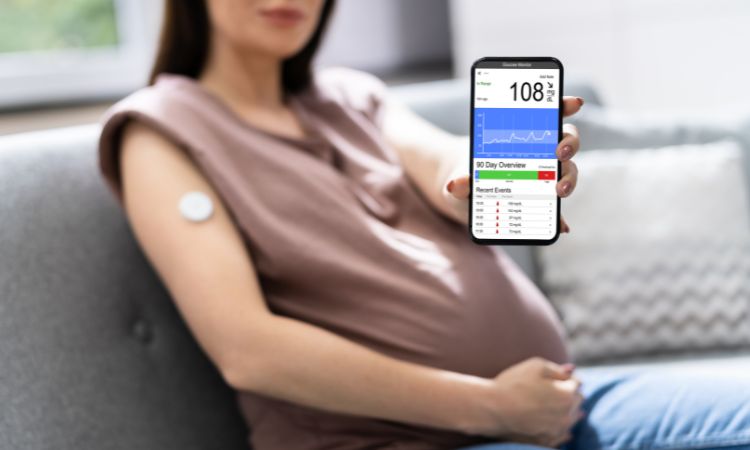Clinical Study on Diabetes Management for Pregnant Women Aims to Improve Outcomes for Maternal and Infant Health

The 2024 Herman G. Berkman Diabetes Clinical Innovation Fund grant was awarded to Gianna Wilkie, MD, to conduct a clinical study at UMass Memorial Medical Center of pregnant women with type 2 diabetes comparing continuous glucose monitoring (CGM) to multiple daily fingersticks to check blood sugars. The randomized study will include maternal blood glucose control, patient satisfaction, and other perinatal outcomes.
Type 2 diabetes during pregnancy can lead to health problems for both mothers and babies that last long after the child is born. The childbearing mother may face higher risks of heart disease, kidney problems, and other health concerns later in life. The child could be more likely to develop obesity, diabetes, learning difficulties, or other health issues as they grow up.
These effects can even impact future generations in the family. Newer technologies including CGM to improve glucose monitoring strategies have not been well-studied in pregnant women living with diabetes.

Many pregnant women with diabetes in the UMass Memorial Health system identify as Hispanic or Black/African American and additionally represent an underserved population of lower socioeconomic status. Helping this at-risk population could have far-reaching impacts on reducing childhood diabetes and obesity.
Previous Berkman Fund Recipients
Developing a Liver Disease Screening Process in the Adult Diabetes Clinic
Liver disease is strongly associated with type 2 diabetes and obesity. It remains underdiagnosed and undertreated and many people living with T2D are unaware they have it. This project, led by Endocrinologist Madona Azar, MD, implemented a new process utilizing a screening tool in the UMass Memorial diabetes clinic that analyzes clinically available data to determine patient risk of liver fibrosis.
AI Diabetic Retinopathy Screening in Primary Care
This project is implementing an artificial intelligence (AI) diabetic retinopathy screening program in Family Medicine clinics to identify eye disease and improve comprehensive care for people living with diabetes. Recent studies have identified AI-based algorithms as promising tools for the screening and early identification of diabetic retinopathy to help those at risk. This study, led by optometrist Juan Ding, OD, PhD, is testing the diagnostic accuracy of a hand-held AI-assisted camera used by primary care physicians to screen at-risk individuals for retinal changes indicative of diabetic retinopathy.
The GOOD-ER Program
This randomized clinical trial provided continuous glucose monitors (CGM) to people with diabetes who were currently not using one and arrived at the Emergency Room with high or low blood sugar, or other diabetes-related complications. The recently completed study, led by endocrinologist Dr. Mark O’Connor and emergency physician Dr. Laurel O'Connor, analyzes whether CGM successfully keeps people from returning to the ER with diabetes-related issues, compared to the control group who do not wear a device to monitor their blood sugars.
Improving Inpatient Blood Glucose Management
This project is implementing a carbohydrate counting system for hospitalized inpatients with diabetes throughout the UMass Memorial Health system. The study led by endocrinologist Dr. Leslie Domalik evaluated whether adopting a flexible meal dosing option based on carb counting would improve the outcomes of hospitalized patients with diabetes. The project coordinated the appropriate timing of blood glucose testing, insulin dosing, and administration of rapid-acting mealtime insulin. It will also ensure carbohydrate counts are listed for all food served to hospitalized patients, and better coordinate insulin delivery with meal delivery.
Identifying Diabetes Patients and Leveraging Underutilized Services to improve Care’ (ID PLUS Care)
This project led by Daniel Amante PhD and Adarsha Bajracharya, MD focused on a multidisciplinary, collaborative approach to improve care access, quality, and management for at-risk patients with diabetes. They monitored Electronic Health Record data to identify UMass Medicare Accountable Care Organization patients at risk for negative outcomes and proactively contacted patients to nudge them toward recommended services. It led to Dr. Amante receiving a three-year KL2 Mentored Career Development Training grant to develop a Diabetes Mellitus program using Behavioral economics to Optimize Outreach and Self-management support with Technology (DM-BOOST).
More Diabetes Center of Excellence News
